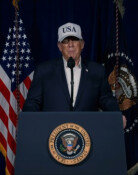Candidates Edgy Over Campaigning Rules
Candidates Edgy Over Campaigning Rules
Posted May. 19, 2006 03:05,
On May 18, the first official day of campaigning for the May 31 local elections, candidates were up from the early morning hours combing the streets, petitioning for votes from voters.
Because of the extreme strictness of the new election law, the phones of each regions election management committee have been ringing off the hook with questions regarding election law in all sorts of circumstances.
In addition to four elections being held at the same time, the lower-level local government elections are going to be held and the multi-member districts system and party nomination system have been introduced, so that even voters are saying, I dont know who is who.
Kim Kyoung-se, a candidate for the lower level local government elections in the city of Cheongju in North Chungcheong Province, was at a loss after receiving an election rule violation bulletin from the Central Election Management Committee for using the slogan, I pledge to be a government official of justice like Superman, and wearing the costume of the main character of the movie Superman. The use of labels, signs, mascots, and symbols is forbidden, was the authoritative interpretation of the North Chungcheong provinces election management committee.
On the other hand, Park In-suk, campaigning for North Chungcheong Province Jeungpyeong Countys main committee election, noted that the regions special product is ginseng and dressed up in a ginseng digger costume, but received an okay from the election management committee and breathed a sigh of relief.
A, who ran in the election for general county magistrate of Jangsu, North Jeolla Province, who circled a farmhouse soliciting support, saw an elderly person carrying a seed plot alone and was about to help, but conscious of election law, discreetly stopped. One of his entourage persistently prevented him, insisting, This falls under the offering service restriction, and it is forbidden in the election law for a candidate himself or a campaigner to help with the work of a voter.
B, running in the main committee election for Gwangju, after having a meal with his older sisters parents-in-law, who recently came to help with campaigning, paid for the meal, after worrying about the law which forbid him from doing so.
He said, I know it is a violation of the law, but there is no way I can ask them to pay for themselves. Whenever my relatives ask me for my business card so they can pass it to their neighbors, I have a tough time explaining that it is a violation of the election law.
One mayoral candidate of a metropolitan area complained, There are so many restrictions in this elections law, so there are too many things to consult about with the election management committee.
Candidates eliminated from primaries running in a different electoral district with no party affiliation, or border candidates running in other types of elections, are confusing voters.
This situation has arisen because current election law make it impossible for candidates within a party who are eliminated in the primaries to register as candidates in the same electoral district with no party affiliation, but changing electoral districts or continuing to run by moving up or downward posts is not restricted.
A candidate, an Uri Party western Gwangju local assembly member, was eliminated in the recent primaries, but changed electoral districts, running in the local assembly elections without a party affiliation. Another candidate who was eliminated from the local assembly primaries of Southern Gwangju, entered the race for southern district leader with no party affiliation.
A wife ran for a husband who was eliminated from the public nomination for the lower level local government election in Mokpo, in South Jeolla Province, and a husband ran instead of his wife as well.




![[단독]폴란드, 韓 해군 최초 잠수함 ‘장보고함’ 무상 양도 안받기로](https://dimg.donga.com/c/138/175/90/1/wps/NEWS/IMAGE/2026/02/27/133437397.1.jpg)


